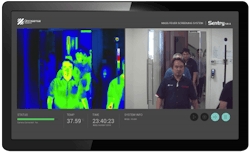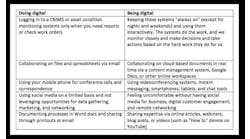Punch the clock, scan the temp, get to work
The traditional practice of punching the clock upon entering the factory has a new element in the COVID era...thermal scanning, which ensures workers are not feverish and, potentially, bringing a virus into the workplace to infect coworkers. This is the new normal. Or it soon will be. And solution providers are rushing to meet the needs of business owners, including Andrew Southern, founder and CEO of Invisible Health Technologies (IHT), who shares his perspective on this trend in the Q&A below.
Smart Industry: How does thermal screening help create a safe industrial workplace?
Invisible Health Technologies' Andrew Southern
Andrew: Thermal screening can help businesses protect the health and well-being of their employees and reduce dangerous and costly outbreaks within a facility. This is both a health and safety concern as well as a productivity concern. It’s a situation where doing the right thing helps everyone involved.
Smart Industry: How do factory personnel respond to being tested? What tips can you share about introducing this practice?
Andrew: The best tip is to keep the scanning as ‘low-touch’ and efficient as possible. People accept and appreciate thermal scanning if it doesn’t inconvenience them. To that end, only systems that are capable of processing large groups of people without stopping (called Mass Fever Screening Systems) should be used to avoid inefficient queues and employee frustration.
Smart Industry: How do you address the privacy issues related to a practice like this?
Andrew: The best way to ensure privacy is protected is to use a system that can operate as a ‘standalone’ solution without any recording enabled. This way, the alerts and responses are done in real-time without storing or saving anything on a hard drive or on a network drive. It is worth noting that there are some systems that require the thermal camera to be set up on a network and use an external laptop or external video recorder to operate. Those system have the potential to be hacked or potentially release sensitive information—so we don’t recommend them.
Smart Industry: What is new about the technology used here?
Andrew: Mass Fever Screening Systems, are the most advanced systems available—capable of scanning groups of people accurately without stopping anyone. These systems have actually been deployed in factories, airports, schools, and hospitals in Singapore for more than ten years—and we are just seeing this technology in the US now because it’s our first pandemic in modern times. We have spent a considerable amount of time and resources educating our customers on the technology so they can make the right decision for their facility.
Invisible Health Technologies' crowd-screening technology in use.
Smart Industry: Is this the new normal for factories moving forward?
Andrew: I believe this technology will be a welcome addition to factories moving forward. It is mature and proven technology that can help identify potential health issues before they become big problems. Thermal scanning does not replace the important need for social distancing, sanitization, and other efforts, but it serves as another tool we can use in the fight against illnesses in the workplace. To that end, we have had tremendous interest in this technology from factories across the country.




